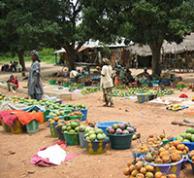Empowered to Make the Right Choices
 You make hundreds of choices a day. Should you skip the coffee because you’re running late? Should you bring your lunch or just grab something from a nearby deli? Which movie should you see tonight? We don’t usually think too deeply about our decisions, and we assume we make these choices based on upon what we want. But our choices are more than that; they are products of our knowledge and awareness of the world around us. You skipped coffee this morning because you know it usually takes 20 minutes to get to work, but there was an important meeting in 15 minutes. You chose the sandwich from the deli because you have seen its advertisement for weeks and you’ve finally caved. You’re choosing that movie because you saw the trailer yesterday, and it has been on your mind ever since. Without this knowledge, or with different knowledge, you could have made completely different choices.
You make hundreds of choices a day. Should you skip the coffee because you’re running late? Should you bring your lunch or just grab something from a nearby deli? Which movie should you see tonight? We don’t usually think too deeply about our decisions, and we assume we make these choices based on upon what we want. But our choices are more than that; they are products of our knowledge and awareness of the world around us. You skipped coffee this morning because you know it usually takes 20 minutes to get to work, but there was an important meeting in 15 minutes. You chose the sandwich from the deli because you have seen its advertisement for weeks and you’ve finally caved. You’re choosing that movie because you saw the trailer yesterday, and it has been on your mind ever since. Without this knowledge, or with different knowledge, you could have made completely different choices.
The same holds true for choices that affect something much more important: our health. The choices we make – the food we eat, the lifestyle we lead, the amount of alcohol we consume – all have significant implications for our long-term health and, potentially, the health of others around us. External sources shape our knowledge about health. For me, those sources range from the evening news to doctors I’ve visited to my mother’s home remedies and many more that I probably don’t remember – or perhaps perceive. Well-communicated health messages can affect the choices we make, which in turn can have a great impact on our individual and collective health outcomes.
The Health Communication Capacity Collaborative (HC3) is a five-year USAID-funded project that focuses on strengthening the capacity of organizations in developing countries to design, implement and evaluate their own high-quality health communication programs. HC3 envisions a world where individuals are empowered to make informed health decisions, where resources and information can be exchanged in communities of practice and where vibrant health communication programs can be implemented. HC3 addresses various health issues, including:
- Family planning and reproductive health
- Child survival
- Maternal and child health
- HIV and AIDS
- Malaria, TB and other infectious diseases; and non-communicable diseases.
Capacity strengthening is at the heart of HC3. HC3 is collecting tools and approaches from successful health communication programs to create and widely disseminate toolkits designed to strengthen the capacity of individuals and organizations.
In addition, HC3 is developing a virtual and face-to-face community to share expertise, knowledge and resources. Other aspects of HC3 include building best practices for mLearning and eLearning curricula; addressing research and evaluation of health communication activities; and developing guidelines for core curricula for university-led health communication courses.
To improve health outcomes, we must focus on the individual. Empowering individuals to make informed choices that have the potential to prevent, treat or manage disease is a great place to start. HC3 aims to do that by building the capacity of individuals and organizations in developing countries to design their own successful health communication programs for strong and healthy communities that are sustainable.






Leave a Reply
Want to join the discussion?Feel free to contribute!